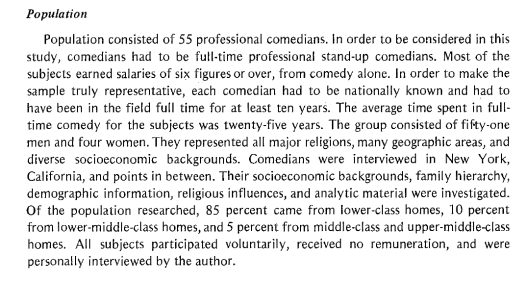[PLEASE PLACE ALL OFF-TOPIC COMMENTS IN THE MOST RECENT OPEN THREAD. THEY WILL NOT BE POSTED IN THIS THREAD]
A famous 1975 study by Samuel S. Janus published in THE AMERICAN JOURNAL OF PSYCHOANALYSIS claimed professional comedians have an incredibly high average IQ of 138 (U.S. norms). Critics argue that IQ tests just measure narrow upper class book smarts, but if that’s true, we shouldn’t expect creative socially brilliant people from mostly working class backgrounds to average higher scores than 99.5% of America. But it is it true? In the section below, Janus explains how the participants were selected:

In the next section Janus describes the test results:

So something doesn’t add up here. Janus claims the comics ranged form IQ 115 to 160+ but then states “the vocabulary subtest was utilized” and doesn’t mention any other subtests anywhere in the paper. So were the IQs based entirely on the Vocab test? But the vocab test doesn’t give an IQ, it gives a scaled score. Scaled scores are like IQs except instead of having a mean of 100 and an SD of 15, they’re scaled to have a mean of 10 and an SD of 3. Of course you can convert scaled scores to IQ equivalents by multiplying by 5 and adding 50, but the highest scaled scores you can get on the WAIS vocabulary subtest was 19, which equates to IQ 145, so how the hell did any comic in the sample score 160+ if only that subtest was used?
Sadly, I think what might have happened is that instead of converting the scaled score to an IQ equivalent, Janus prorated, which you should never do from just one subtest. In other words since he gave only one subtest, he multiplied the score on that one subtest by 11, to estimate what the comics would have scored if all 11 WAIS subtests had been given and then converted this estimated sum of scaled scores to Full-scale IQ using the table in the manual.
But scoring perfect on all 11 subtests is much more rare than scoring perfect on just one, and thus equates to a much higher IQ, so by assuming the Vocabulary subtest could represent all 11 subtests, it looks like he wildly overestimated the IQs of the brightest comics. My guess is that if he had followed the correct procedure (converting Vocab scaled score to IQ equivalent) he would have obtained an average IQ of maybe 127 or so (I’d need the 1955 WAIS manual to know for sure) and that’s before we deduct points for the Flynn effect; though research showing a Flynn effect for Vocabulary is inconsistent.
Bottom line: professional nationally famous U.S. comedians probably average IQs no higher than the mid 120s, which while very high, is nowhere near the genius level this study led us to believe.
This is not surprising, because there are two types of funny people. Some people are funny because they’re smart. And some people are funny because they’re NOT smart, and being the class clown is a way of compensating for the fact that they’re dumb. By acting like school is one big joke, they shield themselves from the humiliation of bad grades:

Pumpkin said he was the class clown once.
everyone smart was the class clown once
Pumpkin was tryna rebel. And he was tryna get sum pussy